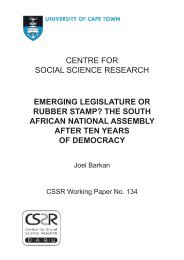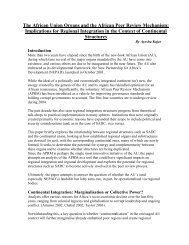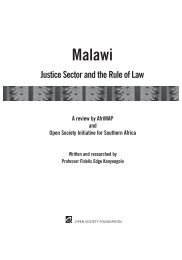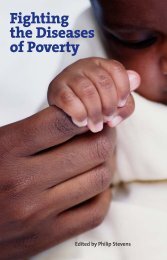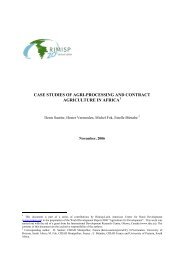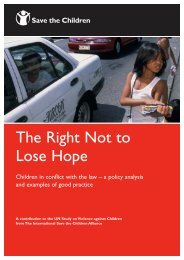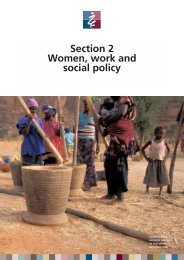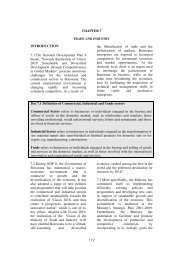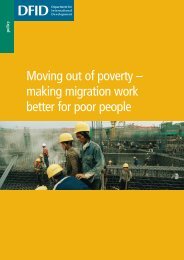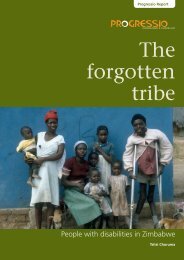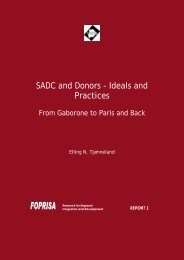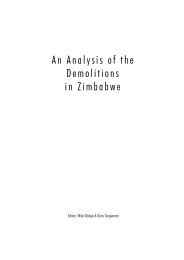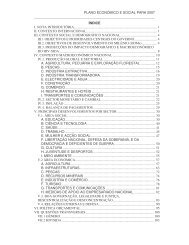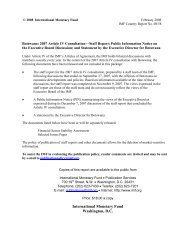Report of the National Conference: Women's Property Rights ... - FAO
Report of the National Conference: Women's Property Rights ... - FAO
Report of the National Conference: Women's Property Rights ... - FAO
You also want an ePaper? Increase the reach of your titles
YUMPU automatically turns print PDFs into web optimized ePapers that Google loves.
Annex 2: Press release, Opening and Closing Speeches, StrategicFrameworkPress ReleaseOn <strong>the</strong> 25-27 January a <strong>National</strong> Workshop on Women’s <strong>Property</strong> <strong>Rights</strong> andLivelihoods in <strong>the</strong> context <strong>of</strong> HIV and AIDS took place at Lusaka’s MulungushiInternational <strong>Conference</strong> Centre. Opening <strong>the</strong> Workshop, <strong>the</strong> Deputy Minister <strong>of</strong>Community Development and Social Service, Mr. S. Mukuka, drew attention toparticularly vulnerable groups, widows and orphans, noting that <strong>the</strong> HIV and AIDSpandemic is increasing <strong>the</strong>ir numbers and that <strong>the</strong>y face injustices “mainly due totraditional practices which have continued despite <strong>the</strong> HIV and AIDS pandemic”.The organizers <strong>of</strong> <strong>the</strong> Workshop, Justice for Widows and Orphans Project (JWOP),Zambia Law Development Commission and <strong>the</strong> Food and Agriculture Organization(<strong>FAO</strong>) brought participants from five countries toge<strong>the</strong>r to share <strong>the</strong>ir experiences and toexamine and devise practical solutions to <strong>the</strong> enormous difficulties faced by women in<strong>the</strong> context <strong>of</strong> gender discrimination, land rights and increasing HIV and AIDS infection.A central focus <strong>of</strong> <strong>the</strong> workshop was <strong>the</strong> plight <strong>of</strong> widows and orphans, <strong>of</strong>ten cruellydispossessed <strong>of</strong> <strong>the</strong>ir properties and thus <strong>the</strong>ir livelihoods in <strong>the</strong> midst <strong>of</strong> bereavement.Present at <strong>the</strong> workshop was Mrs. Chilala, a widow currently living with seventeengraves in her backyard. These have been placed <strong>the</strong>re by her bro<strong>the</strong>r-in-law inpunishment for her refusal to marry him and revoke her rights to her homestead.Although laudable work has been done on her behalf by organizations like Justice forWidows and Orphans Project (JWOP), she has so far obtained no relief. Participants at<strong>the</strong> workshop appealed to <strong>the</strong> Royal Foundation <strong>of</strong> Zambia to intervene and resolve <strong>the</strong>matter. Litigation strategies were also examined as a way <strong>of</strong> <strong>of</strong>fering relief to <strong>the</strong> manywomen who find <strong>the</strong>mselves in similarly desperate circumstances.O<strong>the</strong>r outcomes <strong>of</strong> <strong>the</strong> workshop included <strong>the</strong> proposal for <strong>the</strong> formulation <strong>of</strong> appropriatenational policies, with sufficient funding and implemented across ministerial departmentsthat address customs, practices and laws that disadvantage women and children inparticular. One such law is Zambia’s Intestate Succession Act, which although seekingto improve <strong>the</strong> position <strong>of</strong> widows and children <strong>of</strong> <strong>the</strong> deceased, none<strong>the</strong>less can go muchfur<strong>the</strong>r in protecting <strong>the</strong>ir properties and livelihoods.<strong>Conference</strong> discussions also drew attention to <strong>the</strong> fact that wills are infrequently made,leading to much confusion at death. The need to draw communities’ attention to <strong>the</strong>importance <strong>of</strong> <strong>the</strong>se documents and how <strong>the</strong>y <strong>the</strong>mselves could draft a will wasemphasized. Although much discussion was directed at efforts to empower women andchildren, conference discussion was also directed at ways in which communities andpotential perpetrators might come to better understand <strong>the</strong> particular difficulties andvulnerability <strong>of</strong> women and children.35



